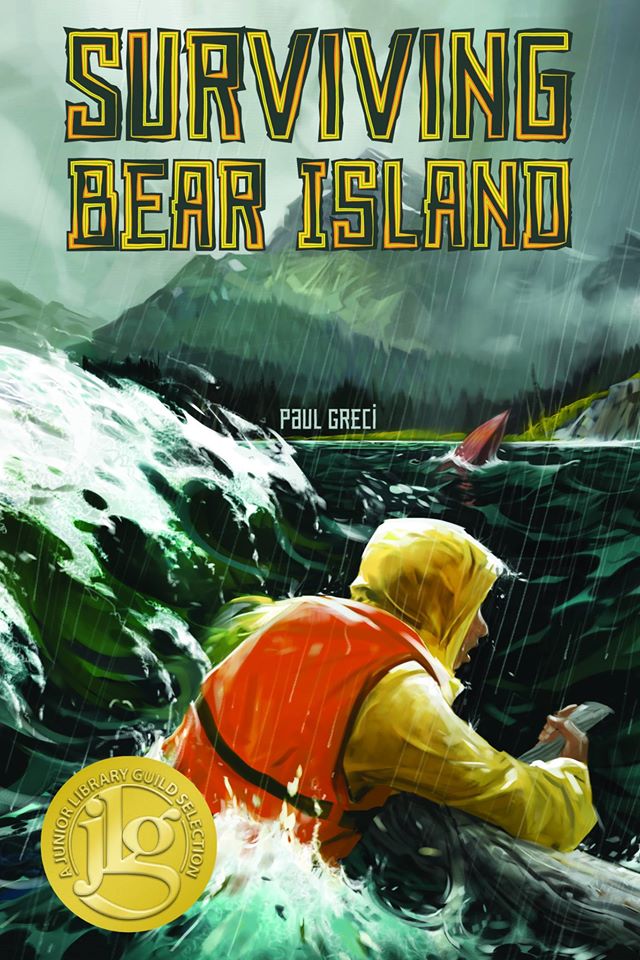 I’m a runner. I train and train and train, mostly on trails in the birch-covered hills of interior Alaska. The marathon is my favorite race. Long distance just seems to suit me. When I run in bear country I carry pepper spray. And yes, I’ve seen a bear or two when I’ve been out running. And, I’ve been turned in my tracks by moose countless times.
I’m a runner. I train and train and train, mostly on trails in the birch-covered hills of interior Alaska. The marathon is my favorite race. Long distance just seems to suit me. When I run in bear country I carry pepper spray. And yes, I’ve seen a bear or two when I’ve been out running. And, I’ve been turned in my tracks by moose countless times.

But the most exciting run I’ve ever had was on the streets of New York.
![]()
I couple years ago my wife, Dana and I were in NYC for a conference. Her employer had sent her to the NCTE Conference and I had come along to attend the ALAN Conference—the Candy Land of YA. If you’ve been to ALAN you know what I’m talking about. If you haven’t and you’re into YA you’ve got to check it out. I’ve attended five times.
But back to the run. We’d just gotten out of a taxi on the Upper East Side. We’d taken it across the park in the dark. 
“Did you get a receipt?” I asked. That was one of my jobs. To make sure the absent-minded professor got the proper documentation for her trip. The cab was still curbside so Dana opened the door, got a receipt, then turned to me and said, “Thanks.”
I nodded to Dana as I watched the cab’s service light go dark. Then it cruised down the Avenue and made a right turn. I’m not sure why I was watching that cab but I was. Then I saw Dana reach for her back pocket to pull her wallet out to tuck the receipt away.
She came up empty handed. “My wallet, it’s gone. Must be in the taxi.”
I abandoned her in a dead sprint. And no, I didn’t have my running shoes on. I had these ancient beauties on instead.

By the time I reached the corner my lungs were burning. At the far end of the block I saw half a dozen taxis stopped at a red light. I picked up the pace, my eyes focused on the closest one. Yes, its service light was off.
Focus. Focus. Focus. Arms pumping. Legs churning as fast as I could make them. Luckily there were only a few pedestrians to dodge as the heels of my black dress shoes clicked on the sidewalk.
The traffic light turned green. I skidded to a stop next to the cab, knocked on the back window and then opened the door. I had no idea what this guy would think. Did cabbies carry weapons? I didn’t know.
“My wife,” I spit out between breaths, “dropped her wallet in the backseat.” I sucked more air. The driver just nodded, which I took as a sign that it was okay to search the seat. There in the far corner a rectangular cloth trophy bumped up from the vinyl.

“Thanks,” I said.
The driver shook his head. “You’re lucky. She never would’ve seen that again.”
My heart pounded through my sweater and my toes burned with hot spots as a walked back down the street. How far had I sprinted? I didn’t know. Maybe a couple hundred yards. A quarter mile at the most. Far enough and hard enough that whoever sat next to me at dinner would need a clothespin for their nose.
walked back down the street. How far had I sprinted? I didn’t know. Maybe a couple hundred yards. A quarter mile at the most. Far enough and hard enough that whoever sat next to me at dinner would need a clothespin for their nose.

eyedropper
Your characters have traits. Maybe you’ve even written a bit of back-story about them to better understand who they are. I do that. Often it’s just a few pages; some of it ends up eye-droppered into the story and some of it is just for me.
Take a close look at your main character’s traits. Can you work into your story some unexpected but logical way for your character to take action? Can your character put a skill to use in a setting or situation where it’d be unexpected?
Can a mid-forties trail runner from Alaska wearing dress shoes he purchased in high school chase down a taxi cab with his wife’s wallet in it at night in New York City?
Unexpected but logical. That’s one of my writing mantras.



 It was a keep-your-breaks-on steep trail that cut this way and that as it plunged toward the river. So what if I’d have to wheel my bike up the hill tomorrow or the next day. I just hoped it’d be a peaceful place to ride out the Flu and get my strength back.
It was a keep-your-breaks-on steep trail that cut this way and that as it plunged toward the river. So what if I’d have to wheel my bike up the hill tomorrow or the next day. I just hoped it’d be a peaceful place to ride out the Flu and get my strength back. These short-haired, teeth-baring hounds were closing in on me and I couldn’t just turn my fully loaded mountain bike around and beat it back up the hill. In my weak condition it would be a challenge just to push the bike up the hill. I wished there was another person with me, someone to take a stand with, but I was alone.
These short-haired, teeth-baring hounds were closing in on me and I couldn’t just turn my fully loaded mountain bike around and beat it back up the hill. In my weak condition it would be a challenge just to push the bike up the hill. I wished there was another person with me, someone to take a stand with, but I was alone.
 But every time you make that journey up Revision Road, every time you face the wild dogs of self-doubt without rolling over belly up, you’ll have that experience to draw on. So, when the wild dogs of self-doubt start howling and snarling you can greet them, tell them that they are even welcome to stay for a while and have some chocolate, or a beer, but you won’t be letting them make a meal of you.
But every time you make that journey up Revision Road, every time you face the wild dogs of self-doubt without rolling over belly up, you’ll have that experience to draw on. So, when the wild dogs of self-doubt start howling and snarling you can greet them, tell them that they are even welcome to stay for a while and have some chocolate, or a beer, but you won’t be letting them make a meal of you.

 To deal with the problem I rubbed a mixture of shaved ice and cayenne pepper on my face. Just kidding. What I really did was sit in front of my wife’s light box, a sunlight simulator, for a half hour a day, and made sure I got outside in the middle of the day for a run, walk or ski. And, I took frequent breaks just to walk in circles on the deck, even if it was twenty or thirty below, to keep myself awake.
To deal with the problem I rubbed a mixture of shaved ice and cayenne pepper on my face. Just kidding. What I really did was sit in front of my wife’s light box, a sunlight simulator, for a half hour a day, and made sure I got outside in the middle of the day for a run, walk or ski. And, I took frequent breaks just to walk in circles on the deck, even if it was twenty or thirty below, to keep myself awake.











